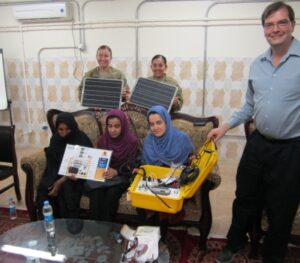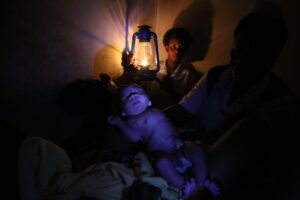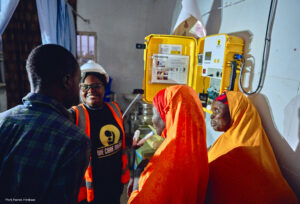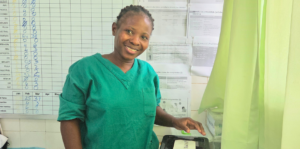 In Afghanistan, pregnant woman and infants face some of the highest risks of dying in the world. USAID General Development Officer, Chris Andrew, recognized the potential of the Solar Suitcase to improve delivery of maternal and child health care, and requested two Solar Suitcases to demonstrate to U.S. and Afghan officials before piloting them in Afghan health facilities. The suitcases arrived this week, and were immediately introduced to Malalai Shinwari, the journalist and women’s activist who is a member of the Wolesi Jirga for Kabul Province, Afghanistan. In the photo, Mr. Andrew is standing. Ms. Shinwari is holding the Solar Suitcase on her lap, and is accompanied by Lini Shinwari, her translator, and a local midwife. Behind them are members of the U.S. Female Engagement team -Teresa Vallejo and Alison Desjardins. We Care Solar would love to see reductions in maternal and newborn mortality in Afghanistan and believe that our light and power units can support national efforts to improve health outcomes for Afghan mothers and babies.
In Afghanistan, pregnant woman and infants face some of the highest risks of dying in the world. USAID General Development Officer, Chris Andrew, recognized the potential of the Solar Suitcase to improve delivery of maternal and child health care, and requested two Solar Suitcases to demonstrate to U.S. and Afghan officials before piloting them in Afghan health facilities. The suitcases arrived this week, and were immediately introduced to Malalai Shinwari, the journalist and women’s activist who is a member of the Wolesi Jirga for Kabul Province, Afghanistan. In the photo, Mr. Andrew is standing. Ms. Shinwari is holding the Solar Suitcase on her lap, and is accompanied by Lini Shinwari, her translator, and a local midwife. Behind them are members of the U.S. Female Engagement team -Teresa Vallejo and Alison Desjardins. We Care Solar would love to see reductions in maternal and newborn mortality in Afghanistan and believe that our light and power units can support national efforts to improve health outcomes for Afghan mothers and babies.

Dr. Laura Stachel Receives AFSIA Lifetime Achievement Award: Full Acceptance Speech
Thank you for this extraordinary honor. To receive a lifetime achievement award from the African Solar Industry Association is deeply meaningful to me. My work—and






